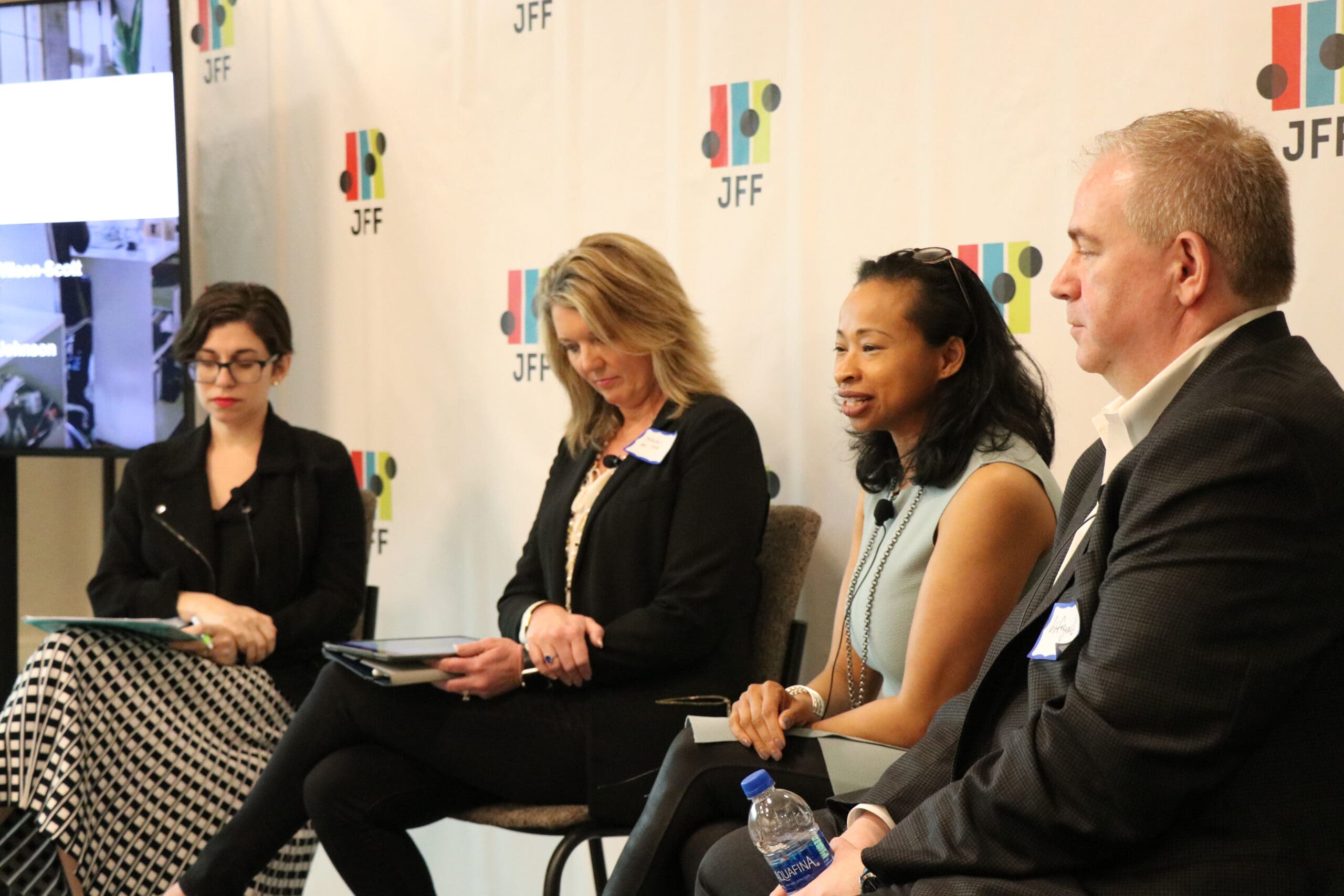
JFFLabs
JFFLabs is the Jobs for the Future innovation lab—we catalyze new ways to achieve our mission at JFF and with our partners. JFFLabs is the Jobs for the Future innovation lab—we catalyze new ways to…

May 21, 2019
On the one-year anniversary of JFFLabs, COO Sonali Kothari reflects on the remarkable progress JFF’s innovation engine has made so far: identifying bold solutions to wage stagnation, accelerating work-based learning, and building opportunity for our most vulnerable people.
Rapid social and economic changes are remaking the American workplace in ways few imagined a short time ago. It’s no surprise that our learning systems can’t keep up and that employers can’t find the skilled workers they need. To resolve this critical tension, JFF last year launched JFFLabs to bridge the traditional education and workforce systems with innovative approaches and technology-enabled solutions.
I joined JFF to help get JFFLabs off the ground, after spending more than seven years and serving in many roles, including chief operating officer, at Kiva, a social impact technology organization that has provided more than $1 billion in working capital to underserved students, farmers, and entrepreneurs worldwide. At JFF, I saw opportunities to address the challenges facing the U.S. workforce—at scale—and I wanted to be at the center of this essential work.
Reflecting on the past year, it’s clear that JFFLabs has made remarkable progress toward that vision. Here are three highlights of our journey so far that I hope will inspire you to join us in our mission—one that strives to build opportunity for our most vulnerable people and build a future that works for all.
Maximizing impact requires strong leadership and strong partnerships.
For our first acceleration cohort, we received applications from over 65 diverse seed- and growth-stage startups and we invested the time to talk to nearly all of them to select four partners. These teams received tailored support to develop and scale work-based learning solutions for advancing frontline employees. We combined the strategies of traditional startup acceleration programs with a deep understanding of learner and worker populations to build what we now call “impact acceleration.”
The experience underlined our guiding principle. When we connect new models with voices and perspectives from traditional systems, we can influence transformational change.
Our first cohort, with support from Walmart, is poised to make a significant impact on the lives of workers and on business bottom lines. It has allowed us to learn while building our community. Soon, we’ll welcome two new cohorts of entrepreneurs, who are designing innovative assessment and virtual reality tools to help workers continually increase their skills and meet the needs of our ever-changing economy.
JFFLabs will be instrumental in helping us to tailor our tech apprenticeship model to enable retail workers across the country to access software development careers.

That’s why last year we launched the $1 Billion Wage Gain Challenge at Horizons, our biennial national summit that hosted over 800 leaders from diverse industries. It was our moonshot, in partnership with Schmidt Futures, to address wage stagnation—with a goal of finding ideas for increasing the annual wages of 100,000 low- and middle-income workers by $10,000 each by the end of 2021.
Conventional wisdom would tell us to start small. But this ambitious goal attracted a host of new partners, all with their own unique spin on how to address wage stagnation and skills gaps.Even more important, by addressing the costs and causes of three decades of stagnant wages, we called attention to a national economic crisis.
Ninety ideas were submitted, and seven finalists were selected to pitch their ideas to a panel of distinguished judges at theASU GSV Summit, a national conference on education and technology. Two innovative companies, Cell-Ed and EMPath, were crowned as winners. Watch the finalists’ pitches on YouTube. And here’s EMPath’s standout winning pitch:
As the future of work becomes today’s reality, businesses must rethink the ways they engage with and support the people they employ.
This summer, we’re excited to launch a corporate action platform, with funding from JPMorgan Chase & Co. This platform will invite companies to join a community to address how to enhance business performance while focusing on the well-being and advancement of their workers.
Corporate human resources and social responsibility offices have immediate needs related to recruitment, retention, benefits, finding and keeping talent, consumer preferences, automation, and other urgent issues. Workers, particularly entry-level and middle-skill workers, struggle to gain the skills they need to advance in their careers.One of the most important lessons we’ve learned is that there is vast potential to find win-win scenarios that address the needs of employers and talent alike.There are practical, business-friendly solutions with incentives and resources to bring the most effective ones to life.
Recently, at the ASU-GSV Summit, JFF convened talent-focused leaders from JPMorgan Chase, Comcast, Walmart, andAmazon to talk about issues affecting some of the largest corporations. We are encouraged by the discussions about solutions like work-based learning and education as an employee benefit, and by the conversations about emerging skills needed to fill jobs in the age of automation.

These stories tell us we should continue following our North Star. For JFF, that’s driving change in the American workforce and education systems to promote economic advancement for all. JFFLabs is helping to build a bridge from these systems to new people, models, and technology. In our inaugural year, it’s been as much about learning and new insights as it has been about initial results and impact.
And we’re not going this alone.Staying true to our mission will require working with new people because, like our economy, education and workforce systems are always in motion and always evolving.
Thanks for joining us to mark our anniversary. One year in at JFFLabs, I know I am at the right place to scale solutions to ensure the future of work accommodates everyone. Together, let’s continue to design and build a future that works.

JFFLabs is the Jobs for the Future innovation lab—we catalyze new ways to achieve our mission at JFF and with our partners. JFFLabs is the Jobs for the Future innovation lab—we catalyze new ways to…

